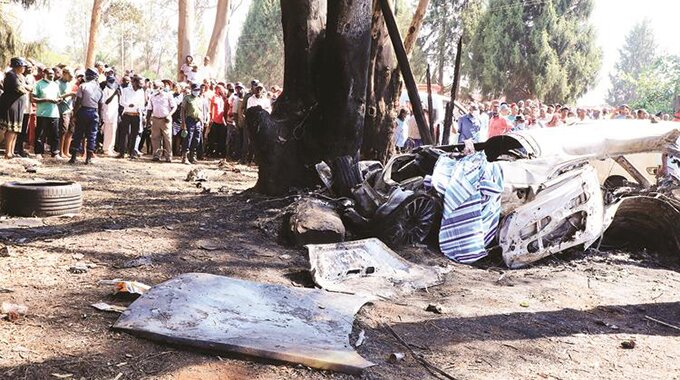BY PHILLIP CHIDAVAENZI
THERE have been widespread concerns over the country’s capacity to deal with the virulent coronavirus (COVID-19), which is rapidly spreading across the world after it was first detected in the Wuhan province of China, where it has already wiped out nearly 3 000 people and affected another 78 000-plus in China and other parts of the world.
Other countries, including the United States, have already rolled out mechanisms in anticipation of the spread of the disease so that it can be contained before causing extensive damage.
Stakeholders in Zimbabwe — which is dealing with massive incapacitation in health institutions and an ailing health delivery system — have expressed concern at the lackadaisical approach they say have been taken by the authorities.
Parirenyatwa Group of Hospitals spokesperson Lenos Dhire on Thursday said they had identified some gaps in the manner in which COVID-19 was being handled in Zimbabwe and there was need to quickly close them for effective handling of the outbreak.
Advertisement
These included disinfecting the casualty department, expediting the provision of protective clothing for staff, improvement in communication in the rapid response team, setting up a screening test and immediately referring all infectious disease cases to Wilkins Hospital.
Such measures, he said, would help “minimise the potential mix of suspected patients with staff members and other patients”.
Such measures needed to be put in place in nearly all health institutions across the country, although this would be a taxing exercise given the economic challenges the country is currently grappling with.
Although Zimbabwe Medical Association (Zima) Mashonaland provincial chairperson Edward Chagonda this week told the Parliamentary Thematic Committee on Peace and Security that epidemiology and disease surveillance in the country was being handled “well”, another doctor, Stanford Chigumira, expressed concern over the health sector’s capacity to deal with a disease of such magnitude.
Chigumira said Zimbabwe was lucky that there had not been a single case of the coronavirus, because it would likely decimate the country.
“With this weak health infrastructure, we will be finished,” he said.
Although the government has assured the nation that it is prepared to deal with COVID-19, with the Chinese government helping to upgrade infectious diseases units at Wilkins Hospital in Harare and
Thorngrove Infectious Diseases Hospital in Bulawayo with medical teams receiving advice and instruction from Unicef and World Health Organisation, stakeholders believe the security system needed to be tightened.
Travelling to and from China has been strongly discouraged until the epidemic is brought under control.
More than 3 000 people in Zimbabwe have been placed on self-quarantine and medical surveillance after returning to the country from the Asian giant, including 2 000 students who were studying abroad.
MDC secretary for health, Henry Madzorera, however, said it was worrisome that there was a denialist attitude on COVID-19, which he said would cost the country.
Advertisement
Acknowledging government efforts, the former Health minister, noted that more could still be done.
Madzorera cited how HIV and Aids was first detected in certain groups in the US population and how the US government quickly acted on it as compared to Africa, something that eventually minimised its impact in America while ravaging Africa for many years.
“COVID-19 is once again going to end up an African problem because of the denialist attitude of our governments. We need robust and preventive interventions now to avoid being the epicentre of the pandemic tomorrow,” he said.
Madzorera implored government to stop all movement of people from China to Zimbabwe, to quarantine those coming from China for three weeks because “this so-called self-quarantine at home does not work” and demonstrated government’s disregard of the lives of Zimbabweans.
This followed indications by Health minister Obadiah Moyo that the government and the Chinese embassy were using “self-quarantine” to avoid the spread of COVID-19.
“We have made sure that all those Chinese personnel who have returned to their jobs, with the support of the Chinese embassy, really self-quarantine. The Chinese embassy is being very strict because it is also in its interest to make sure that none of their nationals comes out to be coronavirus positive. As such, they are giving us as much support as possible,” he said.
Madzorera, however, was sceptical about such an approach.
“Once the virus comes into Zimbabwe, it will be extremely difficult to stop its spread,” he said, instead insisting that locals should desist from visiting China.
He said a visit to a local public hospital was disheartening due to “a pathetic lackadaisical approach to duty by health workers” and said with such lack of commitment, COVID-19 could present a disaster to the country.
“There was no single medicine to give to the patient, and everything, including suture material, was to be purchased at a private pharmacy in town by relatives.
Advertisement
“This gave me insight into the government’s self-proclaimed state of preparedness. If we can’t treat a simple case of assault, can we handle COVID-19?” he queried.
Moyo said the Chinese government had also seconded 12 doctors based at Parirenyatwa Hospital and three of them were involved in matters to do with the virus.
Community Working Group on Health executive director Itai Rusike said it was essential to recognise the importance of community participation in dealing with epidemics of such nature.
“We also call on governments and global organisations to recognise and facilitate community participation through relevant policy and legislation and resource community participation in health systems. The current epidemic is not only of the Chinese government and the affected countries, but requires a global response,” Rusike said recently.
“It is not simply the health system itself which is at stake from the threat of a global coronavirus outbreak, but the health of the whole nations, today and for the future.”
Rusike urged the government “to immediately commence robust education awareness campaigns and provide accurate information to its citizens about the infectious coronavirus”.
He admitted that the current state of the country’s health delivery system needed to be boosted to ensure effective containment should the disease hit the country.
“It is undeniable that the current broken health delivery system makes Zimbabwe very vulnerable should the virus spread into this country. The government should increase its funding to health, and focus the spending on disease prevention,” Rusike said.
– NEWSDAY








